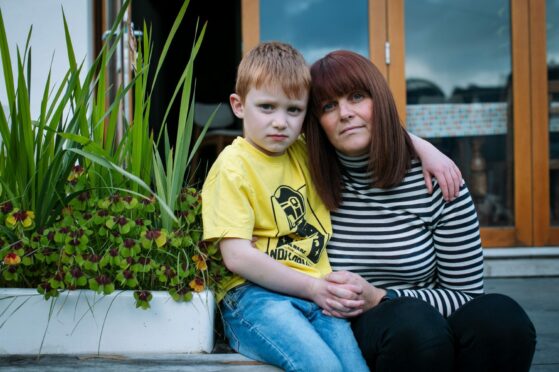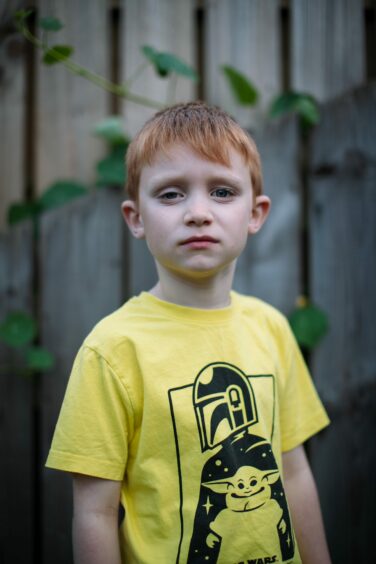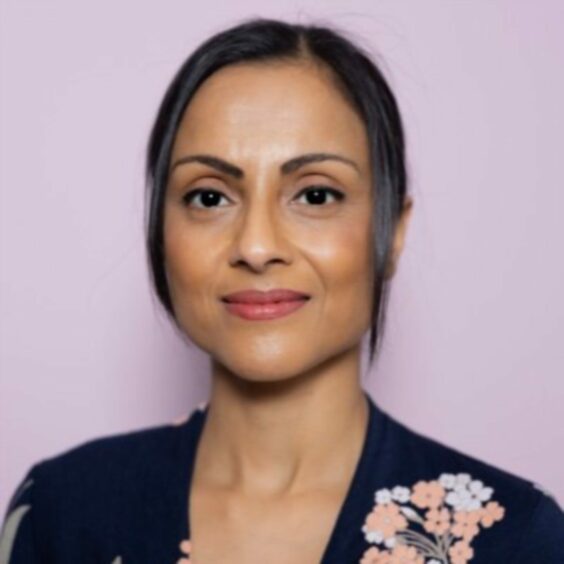
Awareness and research into the impact of Long Covid on young Scots is needed as a matter of urgency, according to parents, doctors and campaigners.
The warnings come days after the World Health Organisation urged countries to take immediate action to tackle “devastating” Long Covid and a landmark study led by the University of Glasgow revealed one in 20 people suffers long-term effects after contracting the virus.
Figures from the Office for National Statistics reveal that 204,000 Scots are living with Long Covid, enduring symptoms more than 12 weeks after infection. Of those more than 75,000 have been suffering the after-effects for more than 12 months.
However, the charity, Long Covid Kids, representing 10,000 families across Britain, believes GPs need better training to be able to spot symptoms in children which, research suggests, may have long-term consequences for their physical and mental health.
Helen Goss, who represents the charity in Scotland, says the attitude that Covid is not serious in children is allowing victims and their families to fall through the cracks.
“There is a distinct lack of public health messaging in the UK and in Scotland about Long Covid, particularly in children, in terms of how it presents and just how debilitating it can be for children and young people,” said Goss.
“Parents and carers are unaware this can happen to their children and are unaware of how bad it can be. You can have a completely healthy, active child and then they develop Long Covid and they become house-bound or bed-bound for weeks, months or even years. That’s not widely known and many GPs aren’t making the connection. They haven’t been supported to be confident to give a diagnosis of Long Covid.
“If a child has Covid and isn’t getting better after four weeks, and especially if they have a grouping of symptoms, doctors should be considering Long Covid.”
The symptoms among children can vary but include gastroenteritis, cardiac issues and neuropsychological changes such as hallucinations and visual and audio disturbances. Goss added: “It’s not a trivial condition and that needs to be recognised.”
Goss, who lives in Aberdeen, suffers from Long Covid, as does her nine-year-old daughter Anna who was infected in March 2020, at the beginning of the pandemic. She would not be diagnosed with Long Covid for another two years.
Anna is now, according to her mother, practically housebound, relies on a wheelchair as she can’t walk for long spells and has missed much of her schooling as she can’t concentrate for more than 30 minutes at a time. She has no friends because she hasn’t interacted with her peers for so long.
“There’s a real problem with lack of support and training,” said Goss. “We have occupational therapists and physios calling the charity to ask us how they should treat their young patients with Long Covid. This shouldn’t be the case. There needs to be a centralised point of information and support because families are really struggling. Long Covid in kids is having a devastating effect on families suffering at home in silence.”
Professor Paul Harrison, a psychiatrist and lead author of a study at Oxford University into the long term outcomes of Covid compared to other respiratory illnesses, agrees more research is needed into the impact of the virus on children. Harrison’s study looked at the psychiatric and neurological diagnoses of people at any stage in the two years after having a Covid infection. In the study of 180,000 under-18s, there was a slightly greater number of children being diagnosed with “brain fog” after contracting Covid-19.
“The numbers were small, but the risk was present,” Harrison said. “Covid affects different people in different ways.
“Most of the studies are around adults, we’re not aware of many that look at children separately, and that’s an area that needs more research. We need to investigate different aspects of Covid in different sectors of the population and children are absolutely one of those sectors.
“We mustn’t forget that, although their risks of getting Long Covid, or post Covid problems, are less than adults, our data and others shows that they do get them so we absolutely can’t forget about them.”
The Scottish Government said support was already being delivered for children and young people with Long Covid and an initial £3 million was being invested to support the NHS to improve the care available for people with Long Covid. It added: “We continue to provide information to support clinicians, including GPs in the identification, assessment and management of people with Long Covid.
“Our Implementation Support Note on managing the long-term effects of Covid-19 has been developed with the input of paediatricians and provides information on supporting children and young people with Long Covid.”
He was in absolute turmoil and we felt so helpless. There was nothing we could do
Just last year, Murray Cameron was running around with his pals, playing football, and getting good reports at school, writes Tracey Bryce.
Fast forward 12 months and his mum describes the youngster as a “shell of his former self”. At one point, he was suffering from terrifying hallucinations that left him screaming. He is, mum Susan is certain, suffering from Long Covid.
“It’s as if it altered his brain,” she said. “It’s been a horrifying time for him – and us – and the situation hasn’t been helped by the fact that so little is still known about the effects of Covid.”
Murray, seven, from Scotstoun in Glasgow, tested positive for Covid in September last year. Susan, 44, said: He was absolutely fine for the first week, completely asymptomatic.”
But then, he started suffering hallucinations. “It was awful,” said his mum. “It started one night when I was reading a bedtime story.
“Murray kept looking over his shoulder as if something was there. When I asked he just said, ‘bad thoughts’. I thought that was strange but I settled him and he slept well. A few days later I was upstairs working when I just heard this scream from the garden. It was Murray. He was clearly terrified and really confused. He even tried to climb over the garden gate as if to get away from something.
“I calmed him down but was quite worried. From then, he spent a lot of time holding his head, crying, saying his brain didn’t feel like his own and begging me to fix it.”
She called the GP, but was told as Murray had Covid, he couldn’t be seen by the doctor. With persistence, it was agreed to make an urgent referral to psychiatry. But while the family waited, Murray deteriorated.
“Murray wasn’t sleeping. It would take me until midnight to settle him and two hours later he would be up, pacing and clearly terrified of something.
“He was having a total of 3-4 hours of broken sleep a night, and when he wasn’t sleeping he was agitated and frustrated. His circulation was terrible and his pupils dilated. He was just in absolute turmoil and we felt helpless as there was nothing we could do. He can’t engage in school lessons like he used to. His cognitive abilities have declined. He stopped speaking for two months. Even now, he’s only saying a few words.
“Murray is a shell of the fun, chatty, bright boy he used to be. It’s heartbreaking.”
Murray has seen GPs, paediatricians, had tests and scans – and still has no diagnosis.
“Nobody seems to be making the connection with Covid,” said Susan. “Something has happened to Murray’s brain, and perhaps a malfunction in his immune system has affected the brain.
“Studies in the US have shown Covid can affect the brain and I’m convinced this is what has happened to Murray.
“Murray is now back at school for a short time for a bit of routine. He can read simple books and the hallucinations seem less severe and happen less. But every time he catches a common cold, his symptoms flare up. There has got to be a connection.
“It’s been torture, and now we just need the experts to put the pieces of the jigsaw together and hopefully save other families from the same trauma.”
Doctor: It needs more money and research
Binita Kane is an NHS consultant, but even she admits finding support for her daughter after she developed Long Covid was a challenge.
She is now leading a research study into children with Long Covid in the UK after being forced to fund private treatment in Germany for her daughter.
“It wasn’t because people didn’t want to help, it’s just there is nothing they can really offer other than physiotherapy,” she said. “The tests being offered on the NHS are not picking up abnormalities caused by Long Covid. So parents are being told there’s nothing wrong and children are being sent for physio and psychological therapies.
“For me, the frustration is it’s just accepted that significant new disability in a child is somehow normal or being ‘made up’, as opposed to a child suffering a serious multi-system illness that needs research and treatment.”
Tests in Germany showed our daughter’s blood was ‘hypercoaguable’ – too ‘sticky’. This was causing her very small blood vessels that allow oxygen into muscles and nerves to become clogged up. Her severe fatigue was likely to be caused by a lack of oxygen getting into her muscle tissues.”
Kane, who works in Manchester, said: “My daughter was really sick – but after being put on to treatments at the clinic tailored to the abnormal findings, she has seen a dramatic improvement and is now back at school full-time compared to an average of around four hours per week last year.
“People say ‘we don’t know much about Long Covid’ but there are now more than 250,000 research papers about how Covid affects us. It’s the most researched disease in history but this is not translating into treatments.
“We need an urgent cash injection and a collaborative research approach.
“We need to move away from arguing about whether or not Covid harms children to finding solutions.”
Low vaccination among young Scots as ministers say parents must take informed decision
Uptake for the Covid vaccination for children is low, despite the Scottish Government offering the protection jab to all young Scots.
The latest figures revealed that up until last month, just 23% of children aged five to 11 and 66% of 12-15-year-olds had received their first dose, while only 11% of 5-11-year-olds and 49% of 12-15-year-olds had received their second dose.
The Scottish Government said: “Children and young people have a very low risk of Covid, severe disease or death due to Covid compared to adults. We have consistently emphasised informed consent and have ensured sufficient information is available to help parents reach an informed decision for their child prior to vaccination.
“The decision to have a child vaccinated against Covid is entirely a matter for parents or carers. All children and young people aged five to 15, who had turned five by 31 August this year, are eligible for two doses. All those aged five to 15 should now have been invited for a first and second dose.”

Enjoy the convenience of having The Sunday Post delivered as a digital ePaper straight to your smartphone, tablet or computer.
Subscribe for only £5.49 a month and enjoy all the benefits of the printed paper as a digital replica.
Subscribe
 © SYSTEM
© SYSTEM